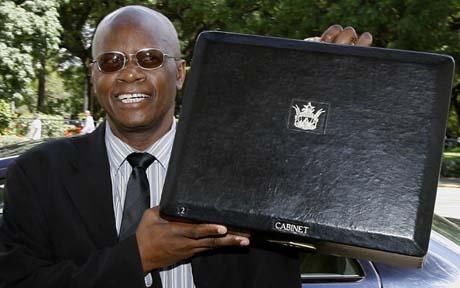Spectrum: Zanu-PF Victory: A Malema called Nel

Joram Nyathi
AT times one is not sure whether it is a case of ignorance, or simply taking partisan politics too far. Whichever way, there is clearly a problem in the land when, in a state of political hysteria, people cannot draw a line between a national programme and a political party project, conflate the two, and opt out of both. The MDC-T has a duty to help its followers, otherwise it risks a backlash from the unintended consequences of its boycott politics.
Whether it chooses to describe it as propaganda or political gimmicks, the truth is the land reform programme and black economic empowerment and indigenisation policies are irreversible. Zimbabwe will never witness another 1998 donors’ conference with white commercial farmers seeking to dictate how much and which land to give to Government. The situation is that bad for those dreaming of a better future in the past. Let them learn something from one whiteman in South Africa.
A Malema called Nel
In the land of Mandela, in the rainbow nation, some whitemen appreciate the risk of false comfort offered by racial privilege and counsel the need for a more inclusive society. There is a sense of uneasiness about the status quo. That is if sentiments expressed by Mr Nel are pervasive enough and he is not sneered at as someone desperate to ingratiate himself to blacks.
But Mr Andries Nel seems to have always been “black”. His official designation is Cooperative Governance and Traditional Affairs deputy minister in the South African government. Originally from the USA, Mr Nel has been an ANC MP since 1994. He was deputy Minister for Justice and Constitutional Development until 2013.
Last week Mr Nel felt compelled to remind racist white South Africans of a few home truths; that they were victims of a system they were fighting to preserve. According to an AFP report, Mr Nel told a roundtable in Johannesburg on ‘whiteness, Afrikaans and Afrikaners’; “For in becoming racialists and exploiters, they (whites) become closed off to important areas of human experience. The essential thing white South Africans lose is openness to the future and to other people. We must show to all those who accept the dominant values (racial segregation) how much they lose in this society and how much they could gain in a good society.”
He said not only should racism be attacked but so should the “unquestioned acceptance of material values underlying racism”, noting that South Africa needed to build a society where opportunity was determined by ability, education and hard work. The country, he warned, faced the challenges of poverty, inequality and unemployment all of which bespoke race rather than ability and hard work by a particular racial group.
He went further, pointing out that a major cause of conflict in SA was unequal distribution of wealth taking on a racial profile. If the wealth gap was removed, he stressed, “there would no longer be an inherent reason for conflict”.
Nobody expects Mr Nel to prescribe a solution on how these racial inequalities can be resolved, the way Julius Malema would. He is only appealing to the humane part of those who know they have been unjustly enriched because of their race; he is making a moral plea, pleading with those with a conscience to examine themselves and justify their wealth set side-by-side with sprawling poverty based purely on race – whether it can be justified by the special capabilities of a racial group and whether it is sustainable in the long-term.
In short, Mr Nel is musing over a very basic matter, but one which raises troubling questions for those who envisage a future of racial harmony in Mandela’s country: Are all South Africans free after 1994? How do we define freedom? Does it guarantee peace in the long-term and how safe are South Africans from race-based conflict? Is the wealth gap narrowing or widening between the races? Would Mandela be happy for his sacrifices were he to rise and take a stroll across Johannesburg?
Zimbabwe has not performed as well as it should. While the odds were always huge, we must accept part of the blame, at the political party and the national level.
The land reform programme was an attempt to address resource ownership imbalances based on race. The matter was addressed robustly, in the only language those like Mr Nel is alluding to in the South African context could understand. Any attempt to avoid casualties would have stymied the whole programme. We would still be paralysed by the willing seller, willing buyer model.
What must be conceded though is that people have not always been faithful to the spirit of the revolution at the national level. Due to greed and corruption, inequality among Zimbabweans is no longer defined in racial terms. Some have grabbed more than their fair share of national resources. It is the same people who give the land reform a bad name, never mind that there would always be those who would attack it anyway regardless of how it was executed. They were wedded to the status quo ante 2000.
Still, race is no longer as much of an issue in Zimbabwe as it is in SA in terms of wealth distribution. Similarly, inequalities are not as acute despite the ostentatious life-styles of a few who presume to be wealthy.
The challenge Zimbabwe has yet to address in the land reform is to empower a majority of the resettled farmers with resources to produce, to earn a decent living first and then to save and be able to invest. They have neither the resources nor the skills yet to stand on their own. Some remain on the land today to avoid embarrassing the ruling party. Government needs to move in urgently to help.
Unfortunately those with resources and have fared better are not always willing to be their brother’s keeper although they have a shared ancestry with their neighbours as children of the revolution. We are not yet “a community” the way Indians, Chinese, whites, Jews and many other races stand by and for each other.
Among other races, like one Jew pointed out, money circulates in the community more than eight times before it gets out or is invested. Among blacks on average money exchanges hands once before it is illegally externalised, to further enrich the former colonial power to which we regularly appeal for “aid”.
At the other end of the spectrum there is cheap propaganda that those who belong to political faiths other than Zanu-PF were denied access to land, and that brings me to the opening of this piece.
To a large extent the land reform and black economic empowerment programmes coincided with the formation of the MDC in 1999. These were Zanu-PF programmes as the ruling party. The MDC took a position diametrically opposite and so did its followers and financiers.
A majority of them have never reconciled themselves to this reality and the power of a ruling party to formulate and implement its own policies, and in a newly-independent state those policies can be as fundamental as altering the property ownership architecture. The land is one such.
The MDC largely opted to stay out. They missed on the farms, they have been cynical about, if not against, Zanu-PF’s indigenisation policies, at various points in the course of their existence threatening to reverse everything should they get into power. (It is a sad irony of Zimbabwe’s land politics; that one can purport to support those who fought the war to take back the land and still oppose a programme to actually take back the land.)
It gets worse. In the past few years Government has launched programmes to empower the youth, the latest being officially launched by Vice President Phelekezela Mphoko on November 4. During a phone-in radio programme this week a caller from Mount Darwin told Youth, Economic Empowerment and Indigenisation minister Patrick Zhuwao that the previous minister had insisted that these were Zanu-PF youth programme. Minister Zhuwao had to explain that Government is implementing national programmes, although initiated by Zanu-PF as the ruling party.
One could tell that there are opposition party supporters who believe they can’t participate in national programmes associated or initiated by Zanu-PF, even with its national mandate as the ruling party. It’s so sad. To the extent that there are often deliberate attempts to conflate ruling party and Government programmes, the MDC parties have done a grave injustice to both their supporters and the country by insinuating that there will be a “cleaner, more legal, and non-chaotic” revolution which will benefit only non-Zanu-PF followers.
Thankfully, Zimbabwe has gone past the situation Mr Nel agonises over in SA where race is still a dominant matter. While there are bigger forces still angry that a ‘profanity’ such as the land reform was ever allowed to take place, race is no longer a key symbol of unequal distribution of wealth in Zimbabwe. Race is no longer an “inherent reason for conflict” but perverse counter-revolutionary politics.










Comments